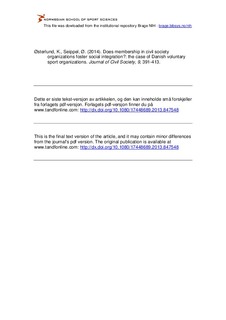| dc.contributor.author | Østerlund, Karste | |
| dc.contributor.author | Seippel, Ørnulf | |
| dc.date.accessioned | 2015-06-03T10:46:04Z | |
| dc.date.available | 2015-06-03T10:46:04Z | |
| dc.date.issued | 2013-11-22 | |
| dc.identifier.citation | Journal of Civil Society. 2013, 9, 391-413 | nb_NO |
| dc.identifier.uri | http://hdl.handle.net/11250/284510 | |
| dc.description | I Brage finner du siste tekst-versjon av artikkelen, og den kan inneholde ubetydelige forskjeller fra forlagets pdf-versjon. Forlagets pdf-versjon finner du på www.tandfonline.com: http://dx.doi.org/10.1080/17448689.2013.847548 / In Brage you'll find the final text version of the article, and it may contain insignificant differences from the journal's pdf version. The original publication is available at www.tandfonline.com: http://dx.doi.org/10.1080/17448689.2013.847548 | nb_NO |
| dc.description.abstract | Voluntary organizations are generally perceived as important arenas in which social integration can be fostered. There is, however, no consensus on the meaning of such integration, and the empirical evidence for the claim is lacking. This article studies social integration within voluntary sport organizations, which make up a significant element of civil society in most Western societies. The article provides a theoretical framework well suited for the study of social integration, which differentiates members according to their levels of social interaction and emotional bonding across four community types: Strong, pragmatic, mediated, and weak. When applying this framework to the case of Danish sport organizations, the distribution of members among the four community types indicates that, although sport organizations are important arenas for the development of social integration, there is also a large minority of members who do not experience social integration. This article shows that both individual characteristics linked to members and organizational characteristics linked to sport organizations exert significant influence on the level and nature of social integration. Jointly, the results demonstrate that there are grounds to reassess the general conception that sport organizations are important arenas in which social integration can be fostered. | nb_NO |
| dc.language.iso | eng | nb_NO |
| dc.publisher | Taylor & Francis | nb_NO |
| dc.subject | social integration | nb_NO |
| dc.subject | voluntary sport organizations | nb_NO |
| dc.subject | community | nb_NO |
| dc.subject | civil society | nb_NO |
| dc.subject | sport | nb_NO |
| dc.title | Does membership in civil society organizations foster social integration?: the case of Danish voluntary sport organizations | nb_NO |
| dc.type | Journal article | nb_NO |
| dc.type | Peer reviewed | nb_NO |
| dc.subject.nsi | VDP::Social science: 200::Economics: 210 | nb_NO |
| dc.subject.nsi | VDP::Social science: 200::Sociology: 220 | nb_NO |
| dc.source.journal | Journal of Civil Society | nb_NO |
| dc.description.localcode | Seksjon for kultur og samfunn / Department of Cultural and Social Studies | nb_NO |
